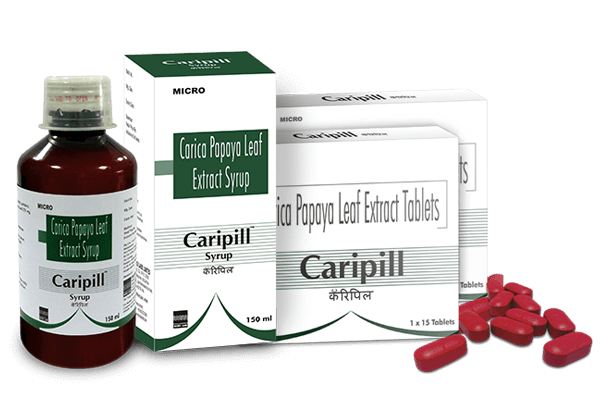
Thrombocytopenia (low platelet count) associated with Dengue.
Precautions and Interactions: Should be used with caution in individuals with bleeding disorders or those taking blood thinning medications such as aspirin or warfarin. Co administration of extracts of Carica papaya with oral hypoglycemic may lead to very low blood glucose as observed in one of the experimental animal study. Thus it is important to closely monitor the blood glucose levels regularly to avoid hypoglycemia.
It has been found to increase the bioavailablity of amiodarone and therefore the dose should be adjusted accordingly when coadministered with carica papaya leaf extract.
In vitro study demonstrated potentiating the action of various antibiotics like penicillin G , ampicillin, amoxyclav, cephalothin,polymyxin B, rifampicin, amikacin, nalidixic acid, gentamycin, cholarmphenicol, oflxacin when co administered with C.Papaya .The extract of C. papaya with antimicrobial agents possesses synergistic properties which act against the pathogenic organisms.
Adverse effects: Nausea, Vomiting, Abdominal pain, Heartburn, Dyspepsia.
Name & Composition: Carica Papaya Leaf Extract; each tablet contains 1100 mg strength & Syrup contains 275 mg / 5 ml
Therapeutic Indications: As an adjuvant for increasing the thrombocytes associated with dengue fever. In thrombocytopenia for treatment and/or prevention of bleeding.
Mechanism of Action: The ALOX 12 gene and PTAFR genes are strongly expressed in megakaryocytes . ALOX-12 has been known to be responsible for the 12-Hydroxyeicosatetraenoic acid (12-HETE) production of platelets. Carica papaya leaf extract has been found to increase the ALOX 12 activity by 15 fold and 13.42 fold increase in PTFAR activity which increases the platelet production.
Dosage & Administration:
Adult :One Tablet to be taken 3 times daily for 5 days.
Children aged 6 to 12 years : 10 ml 3 times daily for 5 days
Contra-indications: Hypersensitivity, Pregnancy.
In males with prostate dysfunction, such as BPH or prostate cancer, C. papaya should be avoided as it increases the iron absorption. Excess iron may increase oxidative stress, especially in the aging male. Iron overload may increase the risk of developing prostate cancer.
Precautions and Interactions: Should be used with caution in individuals with bleeding disorders or those taking blood thinning medications such as aspirin or warfarin. Co administration of extracts of Carica papaya with oral hypoglycemic may lead to very low blood glucose as observed in one of the experimental animal study. Thus it is important to closely monitor the blood glucose levels regularly to avoid hypoglycemia.
It has been found to increase the bioavailablity of amiodarone and therefore the dose should eb adjusted accordingly when coadministered with carica papaya leaf extract.
In vitro study demonstrated potentiating the action of various antibiotics like penicillin G , ampicillin, amoxyclav, cephalothin,polymyxin B, rifampicin, amikacin, nalidixic acid, gentamycin, cholarmphenicol, oflxacin when co administered with C.Papaya .The extract of C. papaya with antimicrobial agents possesses synergistic properties which act against the pathogenic organisms.
Adverse effects: Nausea,Vomiting, Abdominal pain, Heartburn, Dyspepsia.
Further information for the physicians is available upon request in the Medical Department of Micro Labs; 27 Race Course road, Bangalore-560001. Phone: (080) 22370451; Email:medicalservices@microlabs.in